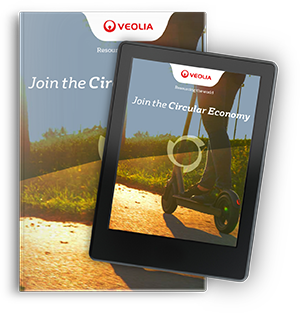The need for environmental stewardship has taken center stage in recent years. More than at any point in our history, individuals, politicians, and the business world are all discussing the necessity of protecting our fragile environment. Across almost every industry, it is very difficult for any business to succeed today without addressing their environmental impact.
The good news is that environmental awareness is now a part of the conversation. The not-so-good news is that it’s not always easy to tell if companies and politicians are just paying lip service to the latest acronym, or if they are actually working toward solutions. As the media and corporate world toss around terms like “sustainability, “ESG,” “EHS," and “circular economy” more and more, it can become confusing to understand exactly what they’re talking about.
What do all these terms mean?
There are several generally accepted terms that all relate to companies’ policies concerning the environment, pollution, the use of natural resources, and workplace conditions. So let’s break it down:
- Sustainability is the umbrella term for all the others. According to the UN World Commission on Environmental and Development, the definition of sustainability is development that meets the needs of the present without compromising the ability of future generations to meet their own needs. In other words, it’s a balance between the needs of people, the economy, and the environment.
- ESG stands for environmental, social, and governance. It’s a set of criteria used by investors and consumers to measure how well a company minimizes negative environmental impact, promotes an inclusive, safe working environment, and enforces leadership accountability and transparency.
- CSR refers to corporate social responsibility. The United Nations Industrial Development Organization defines CSR as the management concept by which companies integrate social and environmental concerns into their business operations and interactions with their stakeholders.
- The circular economy is a system to solve resource sustainability challenges. It refers to solutions and business models for industries and individual companies at all scales to reduce, reuse and recycle waste by turning byproducts into productive resources that can be used again.
- Other health and safety acronyms (EHS, HSE, OHS, SHEQ) are used by various industries and regulatory agencies around the world to describe health and safety in the workplace, so they are related, but not quite like the others. If you see one of these acronyms, it’s safe to assume that it is covering health, safety, and the environment:
- EHS is environment, health and safety
- HSE is health, safety and the environment
- OHS is occupational, health and safety
- SHEQ is safety, health, environment and quality
ESG: the quantifiable challenge of our time
Becoming sustainable while remaining profitable or even improving profitability is the challenge of our century for businesses. Finite resources are drying up, becoming harder to find, and are more expensive. Landfills are full of products and resources that still have value to offer. And companies must compete more and more for an increasingly mobile and working-conditions-sensitive workforce.
Sustainability and the other terms we defined bring all these problems together because the solutions are linked. Data-driven ESG reporting for investors combines the environmental impact, societal impact (think employees, customers, and community), and governance dimension. How well a company can meet these resource, waste, and workplace challenges is related to all three concepts.

While ESG reporting as a whole is not an exact science, companies that focus on material ESG factors — that is, factors that truly affect the profitability and success of a company — are far better off. A long-term successful company worth investing in must be dedicated to everything from finding alternative, renewable feedstocks and energy, to providing a safe, motivating workplace for employees, and to fighting company corruption.
Sustainability and profitability, not mutually exclusive
More often than not, sustainability is seen by businesses as a luxury investment or something that may make them look good, but isn't financially viable. However, there is a growing body of evidence that sustainable practices and policies can also lead to greater profits and growth. In other words, despite popular opinion and even prevailing “common sense,” profitability and sustainability are not mutually exclusive.
Examples of sustainable and circular opportunities for profit
According to a World Economic Forum report, major companies like UPS, Nestle, DHL, and others focused heavily on implementing sustainable practices and were able to increase revenue by up to 20% and cut supply chain costs by up to 16%. These practices included things like sourcing from local suppliers, using innovative truck and tire technology to increase efficiency, and collaborating with other companies to share facility and transportation networks.
Sustainable practices and adopting circular business models can help reduce operational costs and create new revenue streams. Cleaning and reusing wastewater means a company does not have to pay to dispose of it or bring in new water. Selling your waste to be used for heat generation in cement production gives you additional revenue. Using heat from one part of your operation to generate power or steam for another means you spend less on energy. The Ellen MacArthur Foundation estimates that the full value of circular opportunities, globally, could save as much as USD $200 billion each year in materials.

Circular business models help build sustainability and profitability because they allow companies to use the product value of their “waste.” Businesses are profitable when they provide the most value possible. In other words, they are profitable because they are useful, not the other way around.
ESG as a measure of sustainability
Rather than a synonym for sustainability, ESG is better described as a measure of sustainability. A sustainable company will have high ratings for its environmental, social and governance policies. Only by combining quantifying progress in all three of these areas can a business thrive and grow in the face of environmental and social challenges to come.


